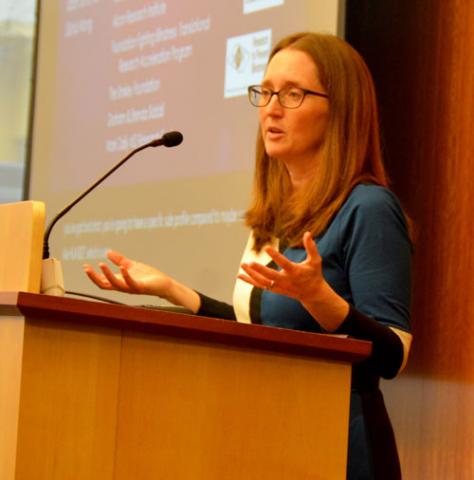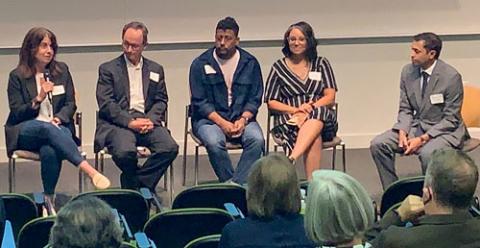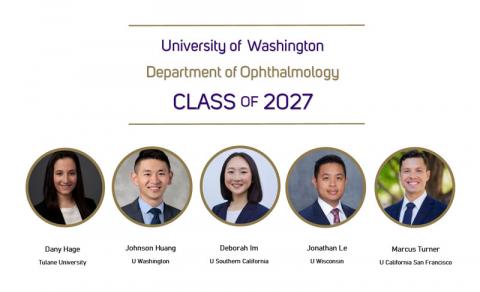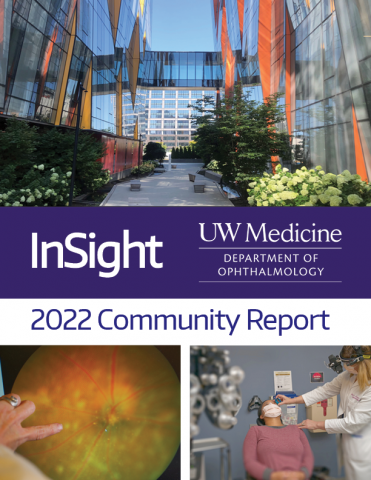UW Department of Ophthalmology
InSight Newsletter | Spring 2023
Welcome to InSight
Welcome to the Spring 2023 edition of the Department of Ophthalmology InSight Newsletter
Spring is a beautiful time in Seattle and especially at the University of Washington, with the cherry blossoms in bloom on the Quad. With the renewal of the season, we are pleased to present our new edition of the InSight newsletter.
The research spotlight in this issue shines on Associate Professor Kathryn Pepple, MD, PhD, who recently received a three-year grant from the Foundation Fighting Blindness to study treatments for uveitis resulting from gene therapy. Dr. Pepple’s lab is at the forefront of understanding how immune mechanisms cause ocular inflammatory disease. This highly competitive award will allow her lab to understand how we can potentially minimize this unwanted complication of gene therapy in the eye.
In our patient care feature, you will learn about the work of one of our newest faculty members, Clinical Associate Professor Eugene May, MD, who has established a neuro-ophthalmology clinic within the MS Center on the UW Medical Center-Northwest campus, dedicated to addressing the visual issues that individuals with multiple sclerosis face.
The Dawn’s Light Foundation, created by Chris and Jenny Carlson, is supporting important work - the diagnosis and management of inherited retinal diseases, including a generous gift to sponsor a one-day conference last fall.
Finally, in our education spotlight, meet the incoming ophthalmology residents joining us in July 2023. Our education team, led by Residency Program Director and Robert E. Kalina Professor Parisa Taravati, MD completed the Herculean annual task of reviewing over 600 applications for our five residency positions and interviewing dozens of candidates for our program. We are fortunate once again to have matched well within our top 5% of candidates, a testament to the competitiveness of our program nationally.
We hope you enjoy our spring update!
Russell Van Gelder, MD, PhD, Professor and Boyd K. Bucey Chair, UW Medicine Department of Ophthalmology
Research Spotlight:
Grant to study prevention of uveitis in ocular gene therapy
Associate Professor Kathryn Pepple, MD, PhD, has received a three-year grant from the Foundation Fighting Blindness to study ocular gene therapy associated with uveitis and test prevention strategies.
“Gene therapy is an amazing technology for patients with inherited eye diseases,” Dr. Pepple said. “With gene therapy, we can hope to restore sight and to prevent blindness in a way never possible before. Inflammation in the eye following gene therapy administration, or gene therapy-associated uveitis, has been identified in several clinical trials. This inflammation is a potential barrier to gene therapy for all patients.”
Dr. Pepple said the goal is to identify a safe and effective treatment strategy to prevent gene therapy-associated inflammation for all patients.
“Any approach we can develop that improves therapeutic delivery and patient outcomes will be beneficial. Looking at inflammation not as a barrier to this great technology but as something that everybody is dealing with, and planning for it, will help make gene therapy an even better treatment in the long run.”
To understand why gene therapies delivered by AAV vectors cause uveitis, Dr. Pepple will collaborate with Glenn Yiu, MD, PhD at UC Davis, to study the problem in mice and non-human primates. They will also test a novel gene therapy vector designed to block innate immune responses in combination with medications used to treat uveitis to identify an effective strategy for human gene therapy patients.
For the past 10 years, Dr. Pepple’s lab at South Lake Union has studied uveitis in rodent models of disease. Dr. Pepple and her team have identified specific cytokines — small proteins crucial to our immune system response — involved in different stages of eye inflammation. This work was recently published in Experimental Eye Research PMID: 35921962. Using animal models, her lab has also tested novel anti-inflammatory therapies in collaboration with industry partners. A recent collaboration involved a Seattle biotech company that has developed a new molecule for blocking T-cell activation. T cells are immune cells responsible for initiating many forms of autoimmune uveitis. This work was published in the March edition of Translational Vision Science and Technology (PMID: 36976157).
Dr. Pepple’s research and clinical efforts all address her central career goal to prevent blindness in her patients with uveitis through effective medical management of ocular inflammation. She recently gave a talk to the Department of Ophthalmology Community Action Board about her work.
“Even though many medications are available for patients with uveitis, treatment failures, and side effects can leave some patients without good disease control. New and better therapies are still needed. Using our animal models of uveitis, we have identified immune cells and cytokines that are important in driving chronic inflammation in the eye. The next step is to confirm this data using human tissue samples.”
To achieve this new goal, Dr. Pepple will collect patient samples to form the University of Washington Ocular Inflammation Biospecimen Repository. She explained that the biorepository would provide critical confirmation about the inflammatory signaling molecules and pathways active in human eyes with uveitis.
“Furthermore, based on our data in mice, we predict we will identify distinct cytokine profiles in eyes with different types and stages of uveitis. Ultimately, we hope to use this molecular information to better tailor treatment strategies for our patients with uveitis.”
Dr. Pepple’s research has been supported by grants from the National Institutes of Health, Foundation Fighting Blindness, Research to Prevent Blindness, and generous gifts from donors, including Graham and Brenda Siddall and Mark J. Daily, MD

Patient Care Spotlight:
Meet Neuro-Ophthalmologist Dr. Eugene May
With the support of the Department of Ophthalmology and the UW Multiple Sclerosis Center, Clinical Associate Professor Eugene May, MD has established a neuro-ophthalmology clinic within the MS Center on the UW Medical Center-Northwest campus, dedicated to addressing the visual issues that individuals with multiple sclerosis face.
“I see patients once a week in the MS clinic at Northwest,” Dr. May said. “It is unusual to have immediate access to a neuro-ophthalmologist on-site in an MS clinic. We can also use optical coherence tomography to monitor patients and teach the MS fellow.”
Dr. May is nationally recognized for his expertise in multiple sclerosis and has recently served as a National MS Society board member.
“There has been remarkable progress in treating MS during my career,” he said. “There are now 19 FDA-approved medications for MS treatment, and we have a far better understanding of MS than when I started.”
Dr. May joined the full-time neuro-ophthalmology faculty of the UW Department of Ophthalmology in April 2022, with appointments in ophthalmology and neurology. He sees patients at the UW Medicine Eye Institute at Harborview, Harborview 4-West Clinic, and the VA Puget Sound Health Care System.
Dr. May was born and raised in New Orleans and received a Bachelor of Science in Engineering from Tulane University.
“I thought I would be a pediatrician until I took a neurobiology course in college, so I went into neurology. In my first year of medical school, I began the path to neuro-ophthalmology,” he said. “What I find interesting about neuro-ophthalmology is that most cases are difficult and have many possible causes, and it's up to us to figure out what is wrong and the best treatment.”
He received a US Army Health Professions Medical Scholarship to the University of Chicago Pritzker School of Medicine, where he became interested in the brainstem neuroanatomy of the eye-movement control system. Dr. May completed a neurology residency and a neuro-ophthalmology fellowship at Walter Reed Army Medical Center in Washington, DC. He was assigned to the ophthalmology and neurology training programs at Madigan Army Medical Center, where he was on the faculty for five years.
Between 1997 and 2022, Dr. May was on the medical staff of the Swedish Medical Center in Seattle and a neuro-ophthalmologist at the Swedish Neuroscience Institute. He was a longtime clinical faculty member, volunteering to teach ophthalmology and neurology residents, as well as seeing patients in the 4West clinic with the residents.
Dr. May and his wife, Patti, an obstetrician at Swedish in Issaquah, have an adult son and daughter. They enjoy spending time outdoors and have hiked worldwide, including climbing Mount Kilimanjaro several years ago.

Philanthropy Spotlight: Dawn's Light Foundation supports research into inherited retinal diseases
When Chris and Jenny Carlson’s son couldn’t see the NEO-WYSE comet, it began a journey for the family that resulted in the creation of the Dawn’s Light Foundation, which supports research into Inherited Retinal Diseases (IRDs).
Through genetic testing, their son Lucas was diagnosed with retinitis pigmentosa. Often diagnosed in childhood or adolescence, retinitis pigmentosa (RP) is an inherited retinal disease, causing progressive loss of night and peripheral vision. The condition often leads to legal blindness and sometimes complete blindness.
Jenny and Chris, who recently retired from the Fred Hutchinson Cancer Center after a career as a genetic epidemiologist, set about creating a foundation to support research into IRDs.
“Ironically, I spent my career studying the genetics of human disease at the Hutch, and then suddenly we found ourselves in genetic counseling as an affected family,” Chris Carlson said. “But we are inspired to use our resources to push things forward. Creating new therapies to treat these diseases will take time and investment.”
In September 2022, sponsored by a generous gift from the Dawn’s Light Foundation, the UW Department of Ophthalmology held a Vision Insights conference at UW Medicine South Lake Union, discussing the diagnosis and management of IRDs.
UW Department of Ophthalmology faculty Associate Professor and Vice Chair for Research Jennifer Chao, MD, PhD and Assistant Professor Debarshi Mustafi, MD, PhD led a featured panel of clinicians, researchers, and patient speakers to discuss current practices and the future of IRD treatment.
The Chao laboratory is working to create models of retinal degenerative diseases that can be used to discover potentially therapeutic drugs. The laboratory takes blood samples from volunteers affected by retinal degenerative diseases to create patient-specific stem cells and grow them into retinal cells to study.
“Ultimately, our group is focused on discovering new drug therapeutics that could benefit those affected by inherited retinal degeneration,” Dr. Chao said.
The Mustafi laboratory is applying sequencing technology to more accurately reveal pathogenic variants that lead to IRDs, especially in the pediatric population.
“Using isolated blood samples from affected IRD patients and their families, our lab can carry out genome sequencing to identify novel pathogenic variants of disease and reconstruct disease haplotypes, which has implications for interpreting disease risks in IRDs for patients and their families,” Dr. Mustafi said.
At the Vision Insights conference, Dr. Mustafi discussed pediatric diseases and new emerging genetic sequencing technologies that have the potential to provide a faster and more accurate diagnosis. They were joined by Research Associate Professor Ram Sabesan, PhD, who studies high-resolution functional imaging of the retina in IRD patients, and Timothy Cherry, MD, Assistant Professor and Principal Investigator at the Seattle Children’s Research Institute, who highlighted how his lab is using model systems called retinal organoids to study IRDs. The event also included a patient and family panel.
“It was a very successful event in that it rallied the community of patients, researchers, and clinicians around the study of IRDs,” Carlson said. “We hope that it can happen again in the future.”

Education Spotlight:
Welcome to our Ophthalmology residents in the class of 2027
We are excited to announce the incoming residents joining us in July 2023. Their first year is a joint internship with the Department of Internal Medicine. Learn more about our residency program at ophthalmology.washington.edu/education/residency
They are:
Dany Hage, Tulane University
Johnson Huang, University of Washington
Deborah Im, University of Southern California
Jonathan Le, University of Wisconsin
Marcus Turner, University of California, San Francisco

2022 Community Report now available
InSight, the 2022 Community Report of the Department of Ophthalmology, has been published and is available online HERE.
Because of the COVID-19 pandemic, this is the first Community Report in three years. Despite the significant challenges during this time, we have continued to pursue our singular mission: to alleviate suffering from eye disease. We continue to do this through our robust research programs, outstanding patient care, educational programs to train the next generation of physicians, and by gifts from generous donors and grateful patients. We have had a remarkable year in the department in each of these areas and are delighted to share our progress with you.
